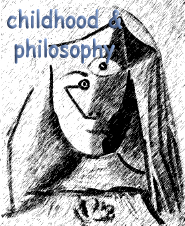philosophical dialogue with children about complex social issues: a debate about texts and practices
DOI:
https://doi.org/10.12957/childphilo.2020.37827Keywords:
murris, chetty, race, history, dialogueAbstract
In this article, I report on my reading of a debate between two practitioners and scholars of philosophy with children – Karin Murris and Darren Chetty. The parts of their exchanges I have chosen to focus on relate to a children's book called Tusk Tusk by David McKee. Their respective arguments raise questions for me about the relationship between the starting text (or stimulus) and issues of importance in the wider world. Although Chetty sees benefits in using picture books, he appears to believe there is an over-reliance on fables and other magical tales and that alternative starting points could be more suitable for exploring complex social issues with historical dimensions. Murris, on the other hand, seems to appreciate the lack of historical perspective that is evident in many of her preferred picture books. She values their ‘universal’ and ‘magical’ aspects because they stimulate ‘rhizomatic’ dialogues that are spontaneous and non-hierarchical. In this commentary I trace what, to me, are the most significant lines of argument put forward by Chetty and Murris. In response, I suggest some practical ideas for choosing texts and ‘reading against the text’ – a term both writers use. I also ask and answer the question: ‘In sessions of philosophical dialogue, should adults bring to children for consideration issues they regard as important or refrain from doing so?’
Downloads
References
Bakhtin, M, Translated by Vern W. M. (1986) The Problem of the Text. In: Speech Genres and
Other Late Essays, Austin: University of Texas Press, 1987
Blum, L. ‘I’m not a racist but ...’ The Moral Quandry of Race, Ithaka and London: Cornell
University Press, 2002
Chetty, D. The Elephant in the Room: Picturebooks, Philosophy for Children and Racism,
childhood & philosophy, rio de janeiro, volume 10, number 19, pp. 11–31, 2014
Emmet, D. The Nature of Metaphysical Thinking, London: Macmillan, 1966
Haynes, J; Murris, K. Picturebooks, Pedagogy and Philosophy, New York, London: Routledge, 2012
Hirschfield, L. The Conceptual Politics of Race: Lessons from Our Children, Ethos, 25(1), pp.
–92, 1997
Kendi, I.X. Stamped from the beginning: The definitive history of racist ideas in America, London:
Bodley Head, 2016
Kolakowski, L. (1990) Education to Hatred, Education to Dignity in Modernity on Endless Trial,
Chicago: University of Chicago Press, 1990
Lester, J, Let's Talk About Race, HarperCollins, 2008
Lipman, M. Harry Stottlemeier’s Discovery, Montclair: IAPC, 1982
Lyndon, D. Africa and the Slave Trade UK edition, London: Franklin Watts, 2013
Malaguzzi, G. History, Ideas and Basic Philosophy: An interview with Lella Gandini. In:
Edwards, C. Gandini, L. Forman, G (Eds) The Hundred Languages of Children: The Reggio
Emilia approach – Advanced Reflections (2nd. Edn), WEsport CT: Ablex
McKee, D. Tusk Tusk, London: Andersen Press, 1978
Murris, K. Posthumanism, Philosophy for Children, and Anthony Browne’s ‘Little Beauty’,
Bookbird: A Journal of International Children's Literature, Volume 53, Number 2, pp. 59-65,
a
Murris, K. The Philosophy for Children Curriculum: Resisting ‘Teacher Proof’ Texts and the
Formation of the Ideal Philosopher Child, Studies in Philosophy and Education · 35: 63,
b Available at <https://doi.org/10.1007/s11217-015-9466-3> Accessed 24 July,
Murris, K The Posthuman Child: Educational transformation through philosophy with picture books,
New York, London: Routledge, 2016
Sprod, T. Books into Ideas, Melbourne: Hawker Brownlow, 1993
Tan, S. The Rabbits, London: Hodder Children's Books, 2010
Warden, C. Talking and Thinking Floorbooks: An Approach to Consultation, Observation, Planning
and Assessment in Children's Learning, 3rd. revised addition, Scotland: Mindstretchers,
West, A. Reading Against the Text: Developing Critical Literacy, Changing English, 1:1, 82-101,
Williams, S Artful Dialogues, Teaching Thinking, 19, Birmingham: Imaginative Minds Ltd, 2002
Woodson, J, Illustrations by Lewis, E.B. The Other Side, G.P. New York: Putnam’s Sons, an
imprint of Penguin USA, 2001
Woodson, J. The other side, available at <https://www.jacquelinewoodson.com/the-other-
side> Accessed 23 July, 2018.
Zeldis, Y. D. Who Was Rosa Parks? New York: Grosset & Dunlap, 2016
Zipes, Jack. Breaking the Magic Spell: Radical Theories of Folk and Fairy Tales, London: Heinemann,
Zipes, J. Fairy Tales and the Art of Subversion (2nd edn.) New York: Routledge, 2012




